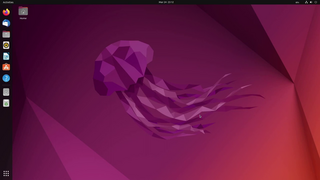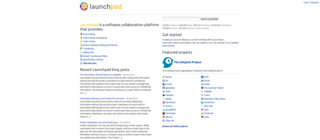
PostgreSQL, also known as Postgres, is a free and open-source relational database management system (RDBMS) emphasizing extensibility and SQL compliance. It was originally named POSTGRES, referring to its origins as a successor to the Ingres database developed at the University of California, Berkeley. In 1996, the project was renamed to PostgreSQL to reflect its support for SQL. After a review in 2007, the development team decided to keep the name PostgreSQL and the alias Postgres.
Zope is a family of free and open-source web application servers written in Python, and their associated online community. Zope stands for "Z Object Publishing Environment", and was the first system using the now common object publishing methodology for the Web. Zope has been called a Python killer app, an application that helped put Python in the spotlight.

PyQt is a Python binding of the cross-platform GUI toolkit Qt, implemented as a Python plug-in. PyQt is free software developed by the British firm Riverbank Computing. It is available under similar terms to Qt versions older than 4.5; this means a variety of licenses including GNU General Public License (GPL) and commercial license, but not the GNU Lesser General Public License (LGPL). PyQt supports Microsoft Windows as well as various kinds of UNIX, including Linux and MacOS.

Canonical Ltd. is a UK-based privately held computer software company founded and funded by South African entrepreneur Mark Shuttleworth to market commercial support and related services for Ubuntu and related projects. Canonical employs staff in more than 30 countries and maintains offices in London, Austin, Boston, Shanghai, Beijing, Taipei, Tokyo and the Isle of Man.

Kexi is a visual database applications creator tool by KDE, designed to fill the gap between spreadsheets and database solutions requiring more sophisticated development. Kexi can be used for designing and implementing databases, data inserting and processing, and performing queries. It is developed within the Calligra project but is released separately.

Lazarus is a free, cross-platform, integrated development environment (IDE) for rapid application development (RAD) using the Free Pascal compiler. Its goal is to provide an easy-to-use development environment for programmers developing with the Object Pascal language, which is as close as possible to Delphi.
CherryPy is an object-oriented web application framework using the Python programming language. It is designed for rapid development of web applications by wrapping the HTTP protocol but stays at a low level and does not offer much more than what is defined in RFC 7231.

LAMP is an acronym denoting one of the most common software stacks for many of the web's most popular applications. However, LAMP now refers to a generic software stack model and its components are largely interchangeable.
A source-code-hosting facility is a file archive and web hosting facility for source code of software, documentation, web pages, and other works, accessible either publicly or privately. They are often used by open-source software projects and other multi-developer projects to maintain revision and version history, or version control. Many repositories provide a bug tracking system, and offer release management, mailing lists, and wiki-based project documentation. Software authors generally retain their copyright when software is posted to a code hosting facilities.

Catalyst is an open source web application framework written in Perl, that closely follows the model–view–controller (MVC) architecture, and supports a number of experimental web patterns. It is written using Moose, a modern object system for Perl. Its design is heavily inspired by frameworks such as Ruby on Rails, Maypole, and Spring.

Launchpad is a web application and website that allows users to develop and maintain software, particularly open-source software. It is developed and maintained by Canonical Ltd.

Compiz is a compositing window manager for the X Window System, using 3D graphics hardware to create fast compositing desktop effects for window management. Effects, such as a minimization animation or a cube workspace, are implemented as loadable plugins. Because it conforms to the ICCCM conventions, Compiz can be used as a substitute for the default Mutter or Metacity, when using GNOME Panel, or KWin in KDE Plasma Workspaces. Internally Compiz uses the OpenGL library as the interface to the graphics hardware.

GNU Bazaar is a distributed and client–server revision control system sponsored by Canonical.
The following tables list notable software packages that are nominal IDEs; standalone tools such as source code editors and GUI builders are not included. These IDEs are listed in alphabetic order of the supported language.
ADempiere is an Enterprise Resource Planning or ERP software package released under a free software license. The verb adempiere in Italian means "to fulfill a duty" or "to accomplish".
Google App Engine is a cloud computing platform as a service for developing and hosting web applications in Google-managed data centers. Applications are sandboxed and run across multiple servers. App Engine offers automatic scaling for web applications—as the number of requests increases for an application, App Engine automatically allocates more resources for the web application to handle the additional demand.
Web2py is an open-source web application framework written in the Python programming language. Web2py allows web developers to program dynamic web content using Python. Web2py is designed to help reduce tedious web development tasks, such as developing web forms from scratch, although a web developer may build a form from scratch if required.

Drizzle is a discontinued free software/open-source relational database management system (DBMS) that was forked from the now-defunct 6.0 development branch of the MySQL DBMS.

Ubuntu One is an OpenID-based single sign-on service operated by Canonical Ltd. to allow users to log onto many Canonical-owned Web sites. Until April 2014, Ubuntu One was also a file hosting service and music store that allowed users to store data "in the cloud".
Mir is a computer display server and, recently, a Wayland compositor for the Linux operating system that is under development by Canonical Ltd. It was planned to replace the currently used X Window System for Ubuntu; however, the plan changed and Mutter was adopted as part of GNOME Shell.









